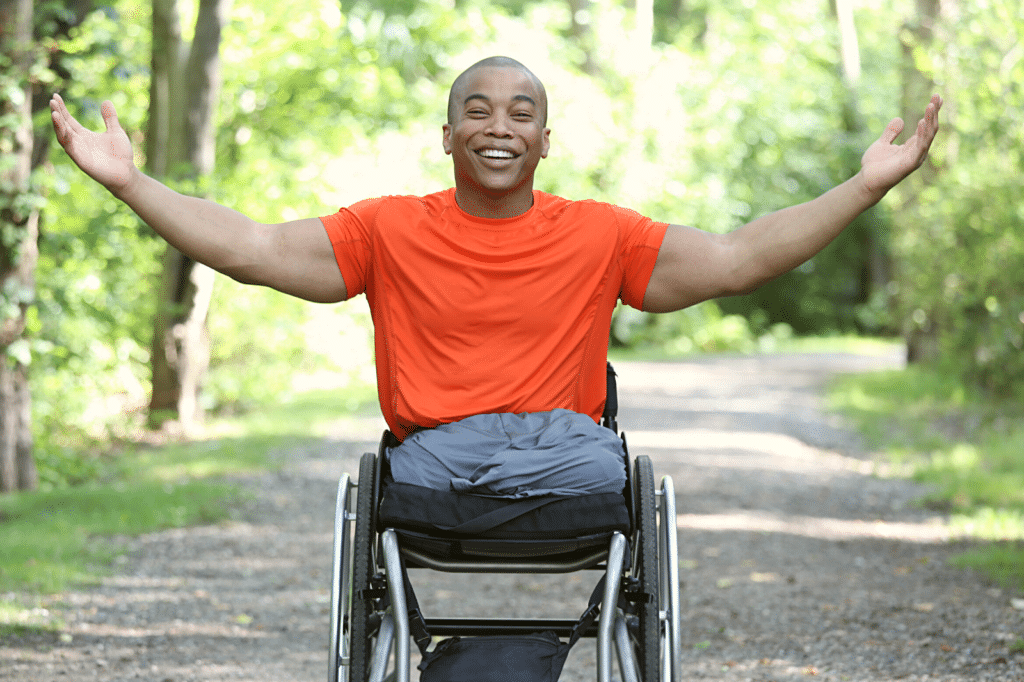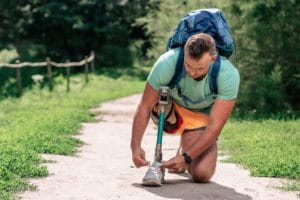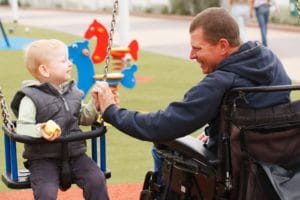Back in the “bad old days,” as I affectionately refer to the time right after my husband Larkin got hurt in Afghanistan, we were at Sea World with a friend attempting to escape from our fluorescent hospital world for a few hours. When a middle school-ish aged child stopped mid kid-at-theme-park-sprint, pointed, and declared, “that guy doesn’t have legs!,” my highly medicated, apparently not amused, husband deadpanned “Don’t sit too close to Shamu” and continued pushing his wheelchair on to our destination. Facepalm all around.
I should probably clarify that at this point we would have been months out from Larkin losing both his legs and a hand while conducting a dismounted patrol in southern Afghanistan. He had been medically evacuated here to San Antonio for care, and was clearly still adjusting to… let’s just say “engaging with the public.” Understandably, this maybe twelve-year-old boy was not prepared for that special encounter either, but who could blame him or his parents? I imagine this situation isn’t covered in the standard parenting manners guide: put your napkin in lap; say please and thank you; and remember not to point and comment on amputees or anyone else who looks different.
Visible injuries and physical differences can be disorienting for everyone. The Wounded Warrior, as was the case for us personally at that time, may be dealing with a recent injury, still establishing their new normal, and adjusting to interacting with the world in new ways. It takes time to fully process any new identity shift. I know it took me months after we got married to write my last name correctly and respond when they called me in waiting rooms, and that was a happy change. When Wounded Warriors are working through difficult adjustments like not being the guy that maxes out every PT test, it can take even longer to accept.
It’s been over ten years now, and Larkin still finds that adults and kids alike engage with him differently when he’s on his prosthetic legs versus when he chooses to use his wheelchair. I can personally attest that he’s just as smart and capable of conversation in any configuration, but somehow the default is to bring the discourse level down and assume he’s somehow less intelligent just because he’s sitting in a wheelchair. The difference between then and now–besides the ten-plus years–is that he’s more comfortable with himself. Just like I know who they’re talking to in waiting rooms, he knows who he is now too.
So what’s the solution for the child who was really only expressing natural surprise and curiosity if perhaps understandably lacking in tact? Some parents encourage their kids to say hello and ask questions, and generally that works out well enough to a point. Usually something along the lines of “Hey Mom look at that guy! What happened to his legs??” followed by a gentle correction, “Oh yes, I see him, why don’t you go say hello and ask,” that ideally ends up in some sort of robot or Ironman comparison that is generally begrudgingly accepted. There are cases of particularly precocious children who get real fixated on the “but what happened” part of the question and refuse to be put off by the simple “I lost them” explanation. They want to know why, and how, and if it hurts, or sometimes even if they can get some too, as apparently robot legs are very cool. That said, anything in the why and how realm really makes for uncomfortable conversations with stranger’s children. I don’t feel comfortable teaching a stranger’s child about war, conflict and trauma, though I do appreciate the critical thinking skills and perseverance in the face of awkward adults. I’m not a parent or mental health expert, but in my experience, kids will follow their parents’ lead. If mom and/or dad encourage a quick friendly exchange and then close it out, most kids are quick to move along, as well.
Maybe the best experience I’ve had with this conversation to date was another interaction here in San Antonio early on, this time at the Zoo; as you can see, we gravitated to wheel friendly places that were likely intended for strollers, but you work with what you have available. We’d spent a couple hours checking out the animals and enjoying being outside, but Larkin was tired and it was time to head home to rest. At that time I was still doing a lot of heavy lifting and mostly pushing and if you’ve been to the San Antonio Zoo and dealt with that hill, you’ll know what I’m talking about. We were running on fumes and likely not our best selves when another little boy, elementary school age or so, said “Grandma, look! What happened?” Grandma did not break stride or indicate any stress, just calmly responded, “He served our country, just like Pop Pop,” and that little boy smiled, said thank you for your service, and went right back to his juice box. I’ve seen several other admirable efforts to find connection – if Larkin’s in a Spurs shirt, oh look, he likes the Spurs just like Daddy, etc, but that Grandmother will also stand out in my mind for her own personal compassion and kindness in sparing us the heavy conversation, and even creating dignity in a difficult place and time.










